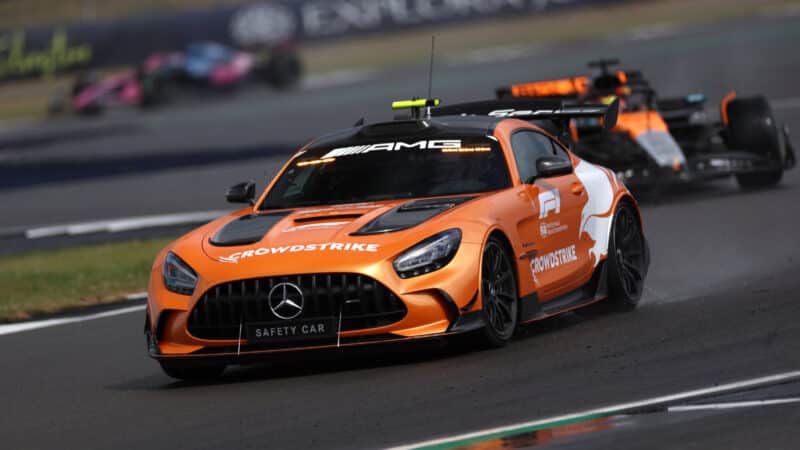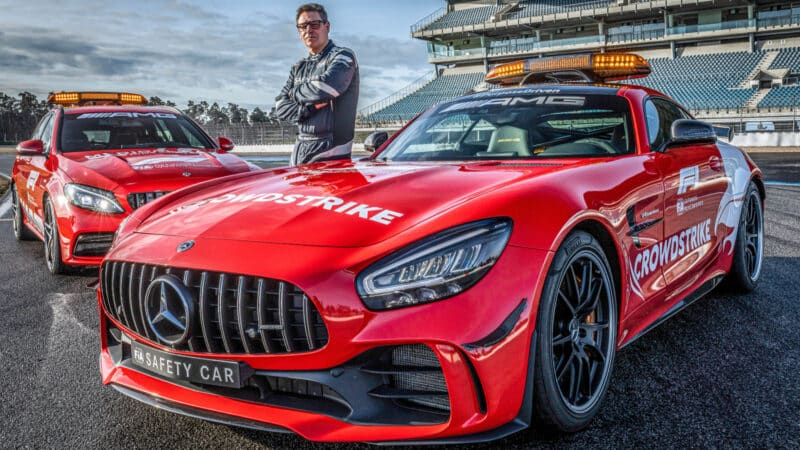How Mercedes and Aston Martin F1 safety cars compare
Formula 1 uses both Mercedes and Aston Martin safety cars. Here's why - and how they are different

The Mercedes safety car leads the field at Silverstone
Since the 2021 season, Formula 1 fans have become accustomed to seeing not one, but two different safety cars leading the pack during race-neutralising conditions.
Mercedes, the long-time supplier since 1996, now shares safety car duties with Aston Martin – a move that introduced a new look to the series.
While both manufacturers bring powerful, race-prepared machines to serve the same role, the Aston Martin Vantage S and the Mercedes-AMG GT Black Series are far from identical.
Each car is packed with distinct engineering features, performance characteristics, and trackside technology tailored to the unique demands of controlling an F1 grid at reduced speed.
Here’s how they compare on and off the track.
Different philosophies, similar performance
While both safety cars are high-performance road cars modified for track use, they differ in character and execution.

Aston Martin’s latest safety car update brought closer to the Mercedes
Aston Martin
The Mercedes-AMG GT Black Series is a track-focused powerhouse engineered for stability, speed, and rapid response during race incidents.It is equipped with a 4.0L V8 biturbo engine producing 720hp, delivering a 0-100km/h time of just 3.2sec and a top speed of 202mph (325km/h).
The car features a lightweight, rigid chassis, advanced double-wishbone suspension, and an aggressive aerodynamics package, including a large front splitter and a massive rear wing to generate substantial downforce.
Inside, the cockpit is outfitted with FIA-mandated telemetry, communications systems, a bank of live video screens, and specialised controls for lighting and sirens, all designed to maximise visibility and operational safety.
The Aston Martin Vantage S, which is an updated version of the original Vantage, is also a highly modified, high-performance machine, introduced at the 2025 Dutch GP.
Powered by a 4.0L twin-turbo V8 engine producing 680hp, the Vantage S accelerates from 0-100km/h in just 3.4sec and matches the Mercedes’ top speed at 202mph (325km/h).
The chassis is reinforced for track rigidity, with bespoke suspension tuning, upgraded brakes, and advanced aerodynamics – most notably a custom front splitter and a large rear wing that provide both stability and downforce.
The updated version introduced mid-2025 has aerodynamic upgrades include a large rear wing spanning the entire width of the rear deck and new grille openings on the hood to improve heat extraction.

The updates Vantage S
Aston Martin
Like the Mercedes, the Vantage is equipped with all the FIA-mandated technology.
Initially, some drivers complained that the Aston Martin was too slow, but the car has been upgraded since to match the pace of the Mercedes.
Technical comparison table
| Aston Martin Vantage S | Mercedes-AMG GT Black Series | |
|---|---|---|
| Engine | 4.0L Twin-Turbo V8 | 4.0L V8 Biturbo (Dry-sump) |
| Power Output | 680hp | 720hp |
| Top Speed | 202mph (325km/h) | 202mph (325km/h) |
| 0–60mph (0–100km/h) | 3.4sec | 3.2sec |
| Weight | 1,645 kg | 1,520 kg |
| Transmission | 8-speed ZF automatic | Dual-clutch |
| Suspension | Bespoke track suspension | Aluminium double-wishbone, motorsport-tuned |
| Aerodynamics | Custom front splitter & large rear wing | Aggressive splitter, massive rear wing, Black Series aero kit |
How do they decide which safety car is used at each grand prix?
Formula 1 has alternated between Aston Martin and Mercedes as official safety car suppliers since 2021.
Both manufacturers provide cars for a set number of races each season, and in 2025, each will be used in 12 events.

Mayländer drives both safety cars
Mercedes
Each season, the FIA organises a schedule specifying which manufacturer’s safety car will be used at each race in advance.
There is no race-by-race selection, and it’s based on this predetermined rotation, ensuring equal participation and exposure throughout the championship.
Regardless of the car brand, the same FIA-appointed safety car driver, Bernd Mayländer, operates the vehicle at every event.
Mayländer has served as F1’s safety car driver since 2000.
The medical car also follows a similar dual-brand split — with the Mercedes-AMG C 63 S Estate and the Aston Martin DBX 707 SUV rotating between races.
